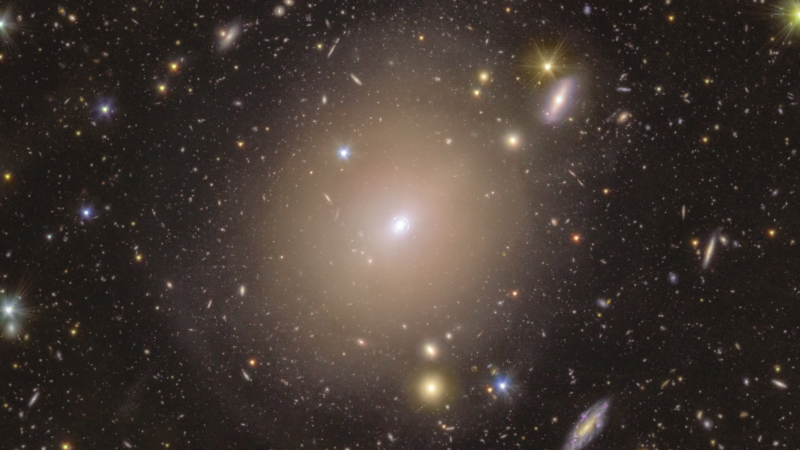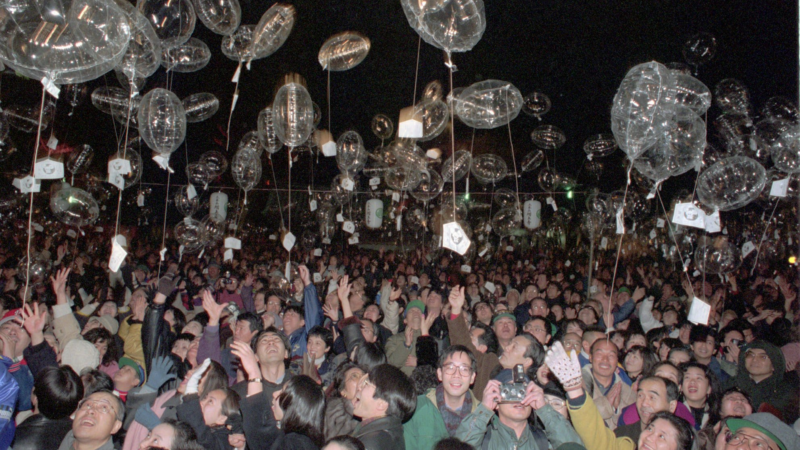Space telescope finds rare ‘Einstein Ring’ of light in nearby galaxy
A rare ring of light surrounding a galaxy nearly 590 million light-years away from Earth has been discovered by a space telescope that scientists hope will uncover more cosmic phenomena throughout the universe, the European Space Agency announced on Monday.
The ring of light, known as an Einstein Ring, was discovered in September 2023 by Euclid, a space telescope on a six-year mission to map out the cosmos by observing billions of galaxies. Photos of the Einstein Ring show a bright ball of light in the center with a bright, cloudy ring around it.
The ring is surrounding NGC 6505, a galaxy that astronomers say is nearby though it is hundreds of millions of light-years away.
The galaxy, NGC 6505, itself is not new to scientists and has been studied since the 19th century, Jacqueline McCleary, assistant professor of physics at Northeastern University says. The Einstein Ring, which had never been seen around this galaxy before, was suddenly easy to find because of Euclid’s high resolution and sensitivity.
“You’d think that after generations of telescopes have looked at this thing for a century and change, we’d have figured out everything that there is to know about it right? Wrong,” McCleary tells NPR. “With other previous generations of telescope, this Einstein Ring was essentially drowned out by the light of this big galaxy.”
Named after Albert Einstein, who predicted the bending of light through his theory of relativity, the first known Einstein Ring was discovered in 1987. Several have been discovered in the decades since, though it is unclear how many exist.

An Einstein Ring is a ring of light around a form of dark matter, galaxy or cluster of galaxies, says Mustapha Ishak, an astrophysics professor at the University of Texas at Dallas. When light from a galaxy bends while moving past a massive object, such as another galaxy or cluster of galaxies, and reaches the telescope, this perfect alignment of all three makes the ring visible to the observer.
NGC 6505 is in alignment with another galaxy that is 4.42 billion light-years away and has never been observed and does not have a name, the ESA says.
“It looks to us like a ring because light is focused at that place in the shape of a ring,” Ishak tells NPR.
They are not visible to the naked eye and can only be seen with a telescope like Euclid. The color of the ring is the same color of the galaxy, ranging from white, yellow, blue and red, astronomers say.
An Einstein Ring is also considered a strong gravitational lensing pattern, says Xiaosheng Huang, a physics and astronomy professor at the University of San Francisco. Gravitational lensing is when a massive object warps time and space, causing light to become distorted and bend as it moves around the object.
“This effect can result in several types of image configurations,” Huang tells NPR about strong gravitational lenses, adding that the Einstein Ring is the most striking one.
The alignment creating the Einstein Ring will remain for some time, allowing astronomers to continue studying it, Ishak says. And telescopes like Euclid likely will give scientists a better understanding of dark matter, invisible matter that has gravitational effects, Huang says. But McCleary hopes it will lead to more “dramatic discoveries” and give scientists a peek into the mysteries of the universe.
“We’ll be able to study distant old galaxies from early in the universe’s history in far better detail and in far greater numbers than we have been able to up to this point,” McCleary says.
Why do we make New Year’s resolutions? A brief history of a long tradition
One of the earliest mentions of New Year's resolutions appeared in a Boston newspaper in 1813. But the practice itself can be traced back to the Babylonians.
A little boy gave her hope for her foster daughter’s future
At a neighborhood park, a young boy noticed Natalie's young foster daughter using a walker. His reaction left Natalie with an unexpected feeling of hope for the future.
Judge orders new trial for Alabama woman sentenced to 18 years in prison after stillbirth
Lee County Circuit Judge Jeffrey Tickal vacated Brooke Shoemaker’s 2020 conviction for chemical endangerment of a child resulting in death. Tickal said Shoemaker's attorneys presented credible new evidence that the infection caused the stillbirth.
Remembering the actors, musicians, writers and artists we lost in 2025
Every year, we remember some of the writers, actors, musicians, filmmakers and performers who died over the past year, and whose lifetime of creative work helped shape our world.
In one year, Trump pivots fentanyl response from public health to drug war
Experts say Biden's focus on addiction health care saved tens of thousands of lives and slowed fentanyl smuggling. Trump scrapped Biden's approach in favor of military strikes.
National Guard arrives in New Orleans for 1st New Year’s since Bourbon Street attack
Nearly a year after a New Year's Day truck attack on Bourbon Street left 14 dead, New Orleans officials are still seeking permanent security solutions.









